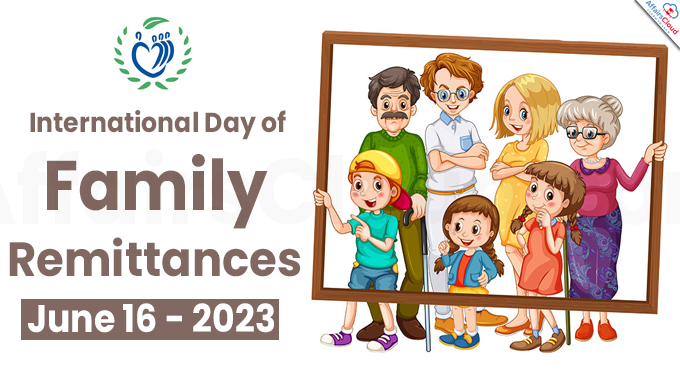 The United Nations (UN)’s International Day of Family Remittances (IDFR) is annually observed on 16th June across the world to recognise the crucial contribution of over 200 million migrant workers across the world, who send money to over 800 million family members in low- and middle-income countries (LMICs).
The United Nations (UN)’s International Day of Family Remittances (IDFR) is annually observed on 16th June across the world to recognise the crucial contribution of over 200 million migrant workers across the world, who send money to over 800 million family members in low- and middle-income countries (LMICs).
- The day also highlights the resilience of migrant workers in experiencing economic insecurities, global pandemic and natural and climate-related disasters.
- The theme of the International Day of Family Remittances 2023 is “Digital remittances towards financial inclusion and cost reduction.”
Note: Remittances refers to the money that is transferred by migrant workers to their native countries with the aim to contribute towards economic development.
Objective:
The theme of IDFR 2023-24 campaign focuses on the benefits of digital remittances. The Emerging digital technologies to enhance financial inclusions in LMICs and to act toward achieving the cost reduction target of 3 as per in the UN’s Sustainable Development Goal (SDG) 10.c.
Background:
i. The International Day of Family Remittances (IDFR), a universally-recognized observance adopted by the Governing Council of the International Fund for Agricultural Development (IFAD), on 16 February 2015.
ii. The United Nations General Assembly (UNGA) adopted the resolution A/RES/72/281 on 12th June 2018, and proclaimed 16th June of every year as the International Day of Family Remittances (IDFR).
Significance:
IDFR is now fully recognized at the global level, as one of the key initiatives to implement the Global Compact for Safe, Orderly and Regular Migration, which urges for the reduction of remittance transfer costs, and greater financial inclusion through remittances.
Family Remittance Campaign:
i. The theme of IDFR 2023-24 campaign focuses on the benefits of digital remittances. The Emerging digital technologies to enhance financial inclusions in LMICs and to act toward achieving the cost reduction target of 3% as per the UN’s Sustainable Development Goal (SDG) 10.c.
ii. IFAD, as custodian of the IDFR, aims at ensuring support of the observance and dissemination of resulting actions in the framework of the decennial (lasting for 10 years) #FamilyRemittances Campaign 2020‑2030: Support one billion people reach their own SDGs.
iii. The campaign highlights best practices and innovative solutions by our partners and industry players that have fostered financial inclusion through digital payments and, encouraging further commitments from diaspora networks and industry partners to work toward greater development and financial inclusion.
Remittance and SDG:
Remittances can contribute to reaching the Sustainable Development Goals (SDGs) in a variety of ways:
i. At household level: by recognizing the positive socioeconomic impact of remittances on families and communities (SDGs 1-6);
ii. At community level: by supporting policies and specific actions to promote synergies between remittances and financial inclusion, encourage market competition and regulatory reform, and mitigate any negative impact resulting from climate change (SDGs 7, 8, 10, 12 and 13);
iii. At national level: by ensuring that the revitalised Global Partnership for Sustainable Development, as outlined in SDG 17 and the Global Compact on Migration promote collaboration across all sectors involved in remittances.
Role of Remittances in achieving the SDGs:
i. SDG 10.c commits, by 2030, to reduce to less than 3% the transaction costs of migrant remittances and eliminate remittance corridors with costs higher than 5%.
ii. Migrant remittances, however, contribute directly and indirectly to several SDGs in addition to 10.c, as outlined in IFAD’s Remittances, investments and the Sustainable Development Goals report.
Global Forum on Remittances, Investment and Development (GFRID):
i. The UNs promoted a framework, Global Forum on Remittances, Investment and Development (GFRID) to engage all sectors, to explore opportunities and challenges in the post-pandemic landscape, with a major focus on main remittance corridors and diaspora investment innovations in Africa.
ii. The summit was hosted by IFAD, the UN Office of the Special Adviser for Africa and the World Bank from 14 to 16 June 2023, at Nairobi (UN Office), Kenya.
Additional info:
As per the World Bank’s report (June 2023), the recorded remittance flows to LMICs are growing an estimated 1.4% to USD 656 billion in 2023, as economic activity in remittance source countries is set to soften, limiting employment and wage gains for migrants., while in 2022, it was USD 626 billion.
About International Fund for Agricultural Development (IFAD):
Instituted in- 1977
President- Alvaro Lario
Headquarters- Rome, Italy




